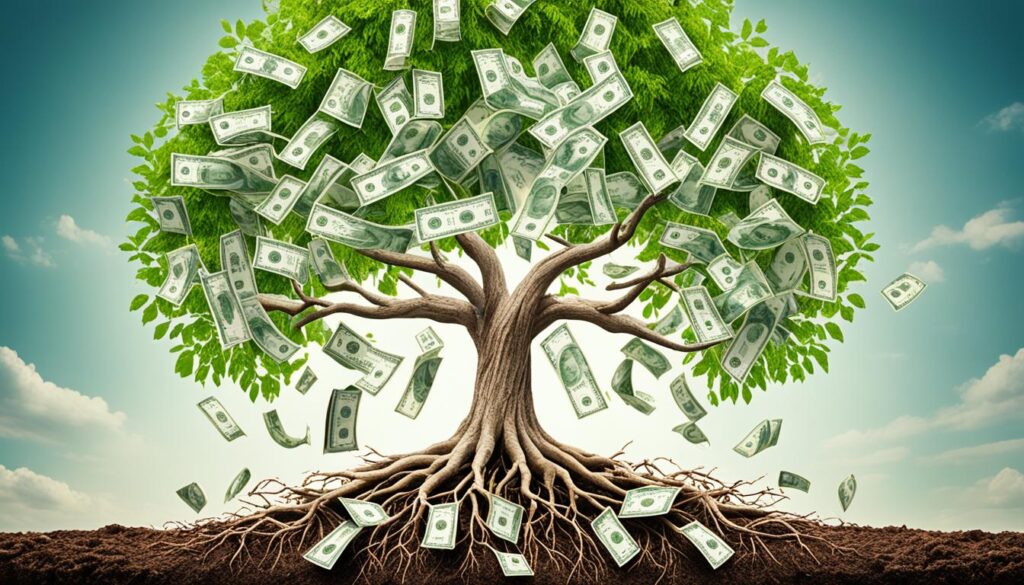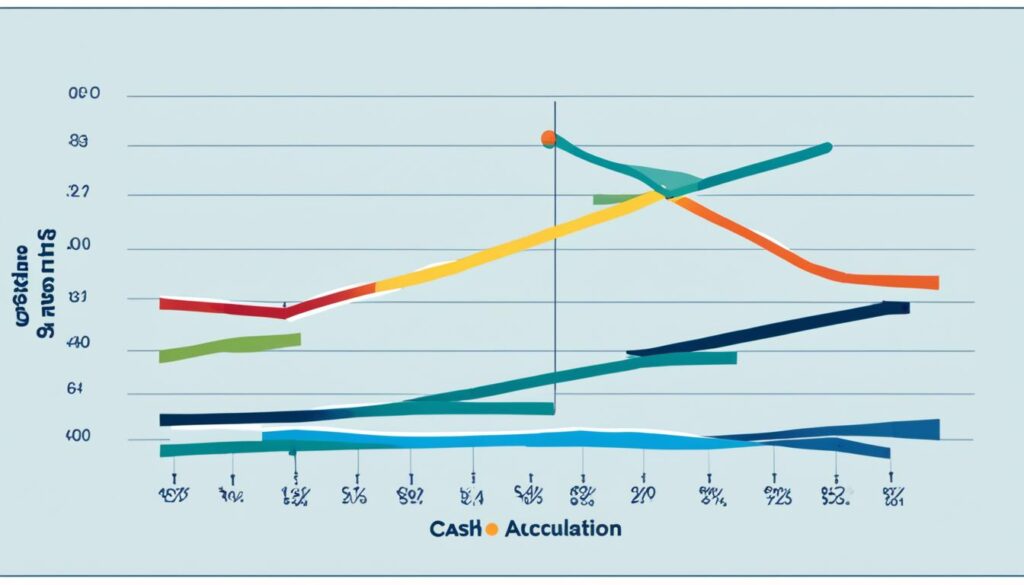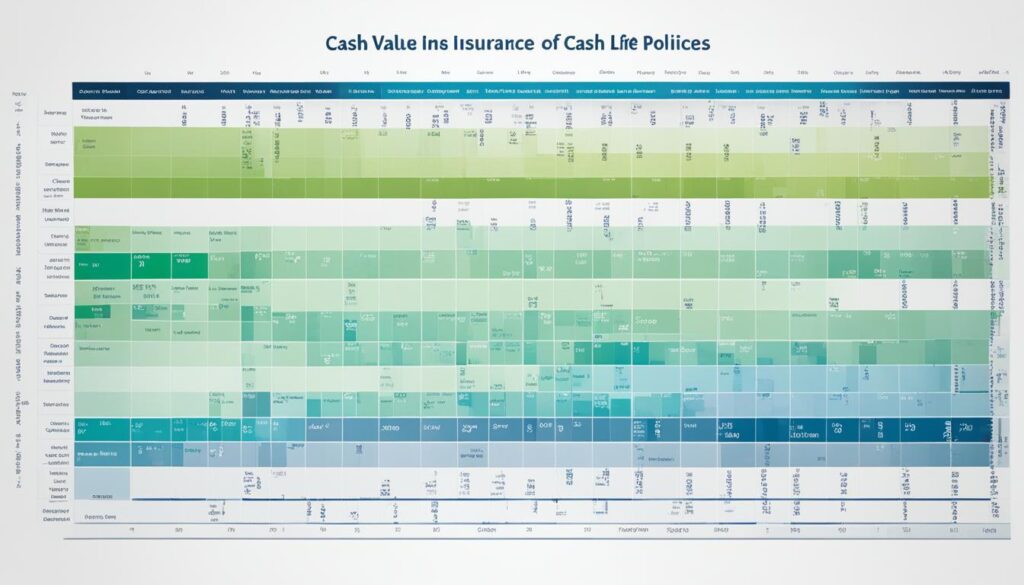Over half of seniors with life insurance don’t know about the cash value feature. This feature could help with their financial planning and managing assets. Cash value life insurance offers more than just a payout after death. It provides security for families and helps build savings for the policyholder’s future.
Senior life insurance policies have a critical feature to check: the cash value component. It’s a part of a permanent life insurance plan, acting as a savings pot that grows. This financial asset is a shield against unexpected costs and a resource for extra retirement money. It’s a smart way to protect and benefit policyholders.
Part of your premium payments goes into a cash value account within the policy. This account grows thanks to the insurance company’s investments. It’s a key resource for seniors, giving them another way to support themselves financially as they get older.
But, it’s crucial to remember that any cash value left unused goes back to the insurance company at the policyholder’s death. Only the death benefit is given to the heirs. This fact makes it important to use the cash value wisely during the policyholder’s life.
Key Takeaways
- Cash value life insurance policies provide a death benefit and a savings component for senior policyholders.
- Understanding and utilizing the cash value can significantly impact retirement planning and financial security.
- Premium payments are channeled to both the cost of the insurance and to building the policy’s cash value.
- The cash value grows tax-deferred and can be accessed through various means, such as loans or direct withdrawals.
- Proper analysis of the cash value component is essential, as unused cash value typically returns to the insurer after the policyholder’s death.
Understanding Cash Value Life Insurance for Senior Policyholders
For seniors, managing money in retirement gets easier with permanent life insurance. Policyholder benefits are key. Besides leaving a legacy, it helps grow wealth with its cash value.
Permanent Life Insurance: A Dual Benefit Approach
Permanent life insurance gives coverage for life and a growing insurance policy cash value. It offers security for loved ones and a way to fund future financial needs.
Premium Payments and Cash Value Accumulation
It’s important to know how premiums build the cash value. At first, most of the premium covers expenses and the policy. Later, the cash surrender value becomes vital, offering financial security when needed.
How Cash Value Grows Over Time
The policy’s cash value growth is key. It can grow at a fixed rate or change with the market. This affects financial planning.

| Policy Type | Features | Cash Value Growth |
|---|---|---|
| Whole Life | Fixed premium and death benefit | Predictable, steady growth |
| Universal Life | Flexible premium and death benefit | Varies with market performance |
Choosing between these depends on personal finances and cash value goals. Seniors should pick what matches their retirement plans.
The Impact of Age on Cash Value Insurance Policies
As people get older, senior life insurance policies change a lot. This affects the insurance policy cash value and how much it costs to keep them. It’s very important for policyholder retirement planning to think about these changes. They need to plan how it impacts their money over time.
Senior life insurance policies do more than offer a payout when someone dies. They let you build up cash over your life. But, as you get older, it gets harder to grow this cash. More of your payment goes towards the rising cost of insurance. So, less money goes into your cash value.
| Age Range | Premium Allocation to Cash Value | Insurance Cost Increase |
|---|---|---|
| 50-60 | High | Lower |
| 61-70 | Moderate | Medium |
| 71+ | Low | Higher |
When planning for retirement, you must change your strategy. You should look at the policy images that insurers give you. These images will show how your cash value might grow. It depends on your age, policy type, and your payments.
- It’s crucial to keep paying premiums to make sure your cash value keeps growing.
- Knowing how the investments behind the cash value perform can help guess future balances.
- If your lifestyle or financial goals change, you should adjust how you manage the policy every year.
In the end, these points are key in using senior life insurance policies to stay financially stable in retirement. Making good policyholder retirement planning decisions early can help you get the most from your insurance policy cash value.
Comparing Cash Value Accumulation in Different Policies
Understanding the different ways cash value grows in life insurance is key for seniors. It helps them grow their financial future. Whole life, universal, and variable policies each have their own method for this growth.
Whole Life Versus Universal Life Policies
Whole life insurance has a set way for growing cash value, promised by the insurer. It’s a reliable option for those who like predictability. On the other hand, universal life insurance is more flexible. Its interest rates change with the market, which could mean more growth but with uncertainty.
Variable Life Insurance and Investment Risks
Variable life insurance depends on how well the market does. This means policyholders could see big returns on their cash value. But, there’s a catch. A bad market can lead to big losses. Seniors must think about their comfort with risk and financial stability before choosing this option.
Risk and Reward: How to Balance for Long-term Growth
Making smart financial plans is vital when thinking about risk and reward in life insurance. Seniors need to weigh their long-term retirement plans against their immediate needs. This helps them pick the policy that grows cash value while keeping their money safe.

Seniors should look at whole life, universal life, and variable life insurance carefully. By doing this, they can choose wisely based on their financial needs and retirement dreams. Each policy has its benefits for growing cash value, important for lasting financial well-being and growth.
Strategies for Enhancing Policyholder Value
For senior policyholders, it’s vital to manage cash value life insurance smartly. This is key for enhancing policyholder value and aiding policyholder retirement planning. It involves understanding how cash value grows, using detailed policy illustrations, and choosing the right insurance products based on personal risk tolerance.
Managing cash value well increases financial power for retirees. This helps them enjoy a comfortable retirement without money worries. Knowing when and how cash value grows in a policy is crucial. Choosing the right type of policy — whole life, universal, or variable life — is also critical.

- Assessing when cash value begins to accumulate.
- Using policy illustrations to project future cash value growth.
- Choosing policies that match personal risk tolerance and financial goals.
Here’s a look at different policy types and how to use them for better retirement planning:
| Policy Type | Description | Pros | Cons |
|---|---|---|---|
| Whole Life Insurance | Provides steady cash value growth with guaranteed returns from the insurer. | Stable growth; low risk. | Lesser returns compared to other policies. |
| Universal Life Insurance | Offers premium flexibility and adjustable benefits. | Chance for higher returns based on interest and market performance. | Higher risk; may underperform. |
| Variable Life Insurance | Invests in various markets to potentially increase cash value. | High returns possible with market growth. | Risky; needs active oversight. |
Choosing the right cash value life insurance policies is a smart strategy. It helps senior policyholders use their policies for policyholder retirement planning effectively. This ensures a financially secure and beneficial retirement.
Analyzing the Cash Value Component for Senior Policyholders
Senior policyholders looking at retirement need to understand cash value life insurance well. It’s vital for financial security and plays a key role in managing wealth and estate planning.
When and How to Access Your Policy’s Cash Value
Accessing your policy’s cash value offers flexible finance options. It can be through withdrawals or loans against this value. However, taking cash out may lower the policy’s cash surrender value and death benefit.
The Tax Implications of Cash Value Withdrawals and Loans
Understanding tax impacts is important when using the cash value. Withdrawals up to what you paid in premiums are usually tax-free. But, going over this amount could lead to taxes as ordinary income. Loans against the policy’s cash value typically aren’t taxable, as long as the policy is active.
Navigating Financial Options for Retirement Planning
Retirement planning with Policyholder retirement planning should include using life insurance cash values wisely. Getting advice from a financial advisor ensures your plans work well with other retirement needs and tax laws.

Real-life Scenarios: Cash Value Utilization in Retirement
In retirement planning, cash value life insurance plays a key role. It helps policyholders gain flexible financial stability. This method strengthens policyholder benefits and boosts retirement income.
Supplementing Retirement Income with Life Insurance
Policyholders use cash value life insurance to improve their retirement income. This lets them use the built-up value of their policy as extra money in retirement. It’s reliable, allowing for withdrawals and loans that keep the main benefits safe.
Case Studies of Successful Cash Value Management
Many retirees have shown how well cash value life insurance works. By looking at real stories, we see how good management helps handle unexpected costs and keep a comfortable life. These examples teach the importance of smart investing and planned withdrawals, keeping the cash value growing and ready to use.
Leveraging Cash Value for Unexpected Expenses
Unexpected costs don’t stop when you retire. So, having an emergency fund is key to feeling secure. Cash value life insurance is great for this. It lets people take out or borrow money to pay for surprises without selling other investments. This brings peace of mind and independence in retirement.
Conclusion
Cash value life insurance is more than just a safety net for senior policyholders. It’s also a way to build wealth. Understanding the cash value part is key to making the most of it. This means seniors need to know the details of their policies, how aging affects the cash value, and how to grow this important asset.
The complexity of cash value life insurance shows why planning is crucial. Seniors should use their saved cash with care, thinking about their retirement needs and tax effects. Good planning, based on trustworthy data and the insurer’s financial health, can boost the benefits for senior policyholders.
Cash value life insurance combines protection with the chance to grow money. With careful management of the cash value part, seniors can protect their families. They can also build a strong financial foundation for their retirement.
FAQ
What is cash value life insurance and how does it benefit senior policyholders?
A: Cash value life insurance is a special kind of permanent insurance. It has a death benefit and a savings part. Part of what you pay goes into building cash over time. This can help seniors by giving them funds for retirement or other needs. It also provides a death benefit for their loved ones.
How are premium payments allocated in cash value life insurance?
In cash value life insurance, premiums pay for the death benefit, company costs, and the cash account. Over time, more of the premium might boost the cash value. This depends on the insurance policy’s design.
Can the cash value in a life insurance policy decrease?
Yes, the cash value can go down. This happens if withdrawals are made or costs go up, reducing the cash value. But, some policies have a minimum interest rate. This helps keep a basic growth level for the cash value.
How does the growth of cash value in a policy change over time?
Cash value growth starts slow and increases over time with compounding interest or returns. The growth rate varies with the policy type, market, and interest rates. Whole life policies grow steadily. Universal or variable life policies might see more ups and downs.
What impact does age have on the cash value of life insurance policies for seniors?
As people get older, insurance costs more. This can lower the part of premiums going into cash value. Also, the growth of cash value could be affected by how investments have done in the past and the time policyholders have to let their cash grow.
How do whole life, universal life, and variable life insurance policies compare in terms of cash value accumulation?
Whole life insurance has steady cash value growth with a set interest rate. Universal life offers flexibility with cash value linked to current rates. And variable life can have higher returns from market investments but with more risk.
What strategies can senior policyholders employ to enhance the value of their cash value life insurance policies?
To boost their cash value policies, seniors should review the policy and compare types for growth potential. Using policy illustrations to predict values helps. They need to consider their risk tolerance and financial goals in their choices.
What are the implications of accessing cash value through withdrawals or loans?
Accessing cash value by withdrawals or loans can lower both the death benefit and total cash value. It might lead to taxes if withdrawals go over what was paid in. Loans have interest and, if not handled well, could cause the policy to lapse.
How can cash value life insurance be incorporated into retirement planning?
Cash value life insurance can add to retirement funds through loans or withdrawals. It’s good for unexpected bills, guarding against market changes, and adds a steady resource alongside other retirement savings.
Are there real-life examples where cash value has been successfully managed by seniors?
Yes, many seniors have used the cash value in their policies well. They’ve improved retirement income, handled emergencies, or prepared for estate taxes. These successes show how managing cash value can be key in a full retirement plan.



